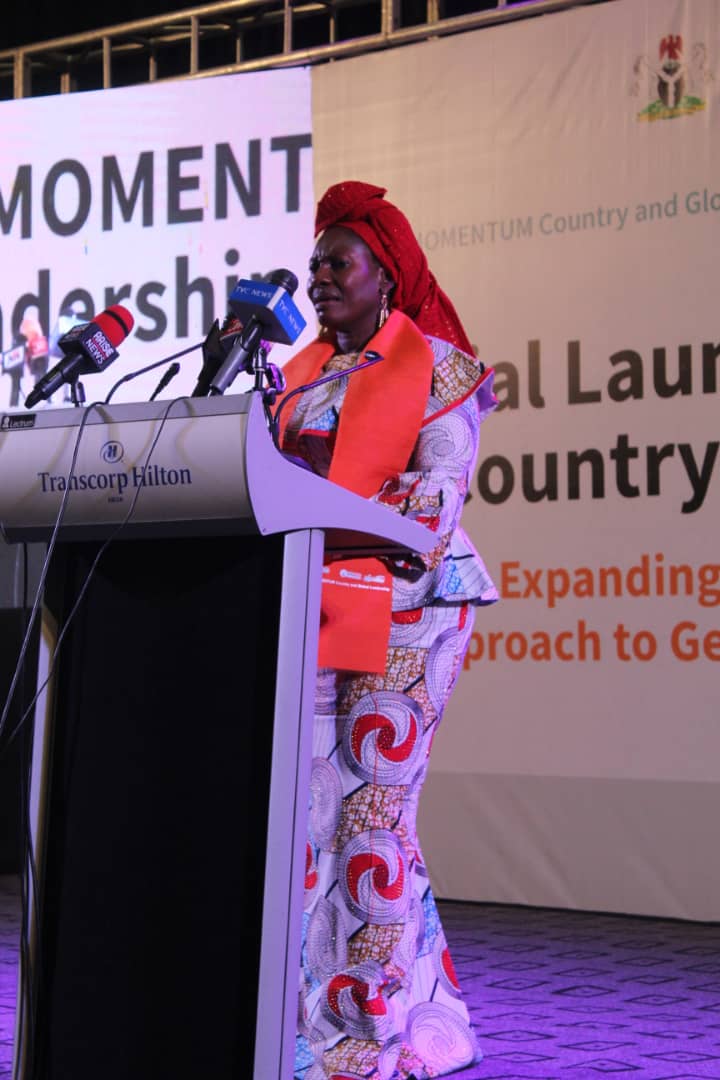
While delivering key note address at the launch of Momentum Country and Global Leadership Project, held at Transcorp Hilton Hotel, Tuesday, 3rd August, 2021, the Honourable Minister of Women Affairs, Dame Pauline K. Tallen, OFR, KSG revealed that the devastating consequences of Gender-Based Violence (GBV) are felt at social, economic and personal levels because of the grievous harm inflicted on victims.
The Honourable Minister added that “It is important to note that Gender-Based Violence is not just a human rights issue, but also a moral overbearing effect, and failure to invest in stopping it, leads to substantial social and economic losses which is estimated at 2 – 8% of the Gross Domestic Product (GDP).


Tallen posited further that “There is also a growing evidence-base to demonstrate that preventing violence that can promote economic growth, improve human dignity, and foster a just and fair society.”
When she was highlighting the success recorded by her Ministry as the National Machinery for the advancement, welfare and general well-being of women, children and other vulnerable groups, she attributed this to be largely due to strategies adopted by the Ministry from addressing administrative and policy gaps, strengthening institutional capacity; promoting gender-equitable attitudes; providing quality services to survivors and ensuring social justice for victims of violence and their families.
Tallen applauded the efforts of President Muhammadu Buhari at tackling GBV:
“I am happy to inform you that we have launched the National Sex Offenders Register as part of activities to commemorate the 16 Days Activism against Gender-Based Violence in November, 2019 with the support of ROLAC. She said that this is currently domiciled in NAPTIP with the idea of naming and shaming perpetrators of Sexual and Gender-Based Violence in Nigeria.
“We have commissioned the re-modeled Safe Space for Victims and Survivors of Gender-Based Violence. We also set up the National CSOs Emergency Response Team to assist in addressing the issues; including launching a Toll-free line 08031230651 for the public to report on the cases of rape, violence and abuse”, Tallen revealed.
The Honourable Minister further updated her audience that 29 States have domesticated the VAPP Act, (2015), while 26 States have domesticated the Child Rights Act (2003) and efforts are on to emphasize the implementation.

She said despite the milestones achieved by the Ministry and her partners, critical factors identified that hinder the progress of GBV response in Nigeria were identified to include “feminized poverty” and this, she said are heightened by the advent of COVID-19 pandemic, discriminatory social norms, weak institutional framework, limited capacity of officers, poor funding and poor harmonization of GBV-data by relevant stakeholders.
Pauline Tallen remarked further that one of the reasons why the initiative of the Momentum Country and Global Leadership (MCGL) to partner with the Federal Ministry of Women Affairs is desirable is for the nation to scale up intervention in GBV-responses in Nigeria especially in the area of maternal mortality and morbidity.
Speaking earlier, the Charge d’ Affaires of the US Embassy in Nigeria, Kathleen FitzGibbon stated that the United States remains committed to working with the Federal, State, and Local health officials to improve the health and wellbeing of Nigerians.
The Charge d’ Affaires stated further that;
“The new Momentum Country and Global Leadership activity administered by the U.S. Agency for International Development will work to increase access to services for survivors of Gender-Based Violence in Sokoto and Ebonyi States to provide them with critical relief from domestic and other forms of gender-based abuse, here in Nigeria.”
Kathleen said that the $15 million investments through USAID will address primary contributors to maternal mortality and mobility through the prevention and mitigation of the consequences of violence against women and girls, over the next five years and drivers of early and forced child marriage, which according to the United Nations, has seen a sharp rise since the onset of COVID-19 in 2019.
The Permanent Secretary Ministry of Women Affairs, Ambassador Anthonia Ekpa, PhD stated that it is important to recognize that GBV is a public health and social development concern with far-reaching consequences for survivors, perpetrators, families, broader society, and economies, primarily affecting women and girls, though she said, boys and men also experience it.
“Violence against women and girls are widespread as a result of gender inequality due to patriarchy, imbalance in socio- economic opportunities, cultural and religious factors, and inadequate enabling legal and policy frameworks, among other factors.”
Ekpa further stated that violence against women and girls are not just a human rights issue, but also a moral imperative.” She cautioned that failure to invest in tackling it leads to substantial social and economic losses and beckoned on all stakeholders present, to use the event to address major contributors to maternity morbidity through the prevention and mitigation of the consequences of violence against women and girls and possible drivers of child and early/forced marriage.
The Permanent Secretary concluded by urging the media to add their voices to that of the Ministry in advocating for more funding for the mitigation of GBV across the federation and also to ensure that girl-child and women are saved from gender-based violence and all other forms of violence against vulnerable groups in Nigeria and the world at large.
The highlight of the event was dance-drama and drama presentation to depict the message of the event, by partners. There was also a touching testimonial from a GBV survivor.
Goodwill messages were received from the Minister of Health, Dr Osagie Ehanire, the Executive Governor of Ebonyi State, Engr. David Umahi and Attorney General of the Federation and Minister of Justice, Abubakar Malami, SAN.
The Momentum Country and Global Leadership Project is a 5-year project aimed at tackling discriminatory Gender and Social Norms which lead to GBV with 11 (Eleven) States identified as pilots.

The ferderal Government had In a bid to end gender- based violence in Nigeria, in collaborateion with USAID has launched the Momentum Country and Global Leadership Project.
The Momentum Country and Global Leadership Project is aimed at curbing discriminatory Gender and Social norms and other practices which lead to Gender-based violence (GBV).
The launch was held in Transcorp Hilton Hotel, Abuja, 3rd August, 2021, with the Vice President, Federal Republic of Nigeria, Professor Yemi Osibanjo represented by the Honourable Minister of Humanitarian Affairs and Disaster Management, Hajia Sadia Umar Faruk Sadique.
“As a nation, we will continue to boldly condemn Gender-Based Violence (GBV), so long as it continues to impact negatively on survivors, victims, families, broader society and economies of nations.”
The VP went further to identify and submit that “From available information, we are more than ever convinced that gender-based violence is driven by structural inequalities and unequal power relations that render women subordinate to men, due to limited access to education, employment, finances, healthcare and opportunities to contribute to their families, communities and the nation’s economic growth.”
Professor Oshinbajo stated the collective resolve of Nigerians
“to stamp out this evil from our society” and declare FG’s support for the Federal Ministry of Women Affairs as the “National Machinery” “under the dynamic leadership of Dame Pauline K. Tallen OFR, KSG to address the menace from the angle of legislation, advocacy and funding.”









Leave a Reply